
Wrapped: a n i n T rodu CT ion
The Bauhaus school’s innovations in tubular metal furniture were a significant influence on French a rt d eco designers (including Louis Sognot, r ené Herbst, Le Corbusier and Charlotte perriand) who rejected the neoclassical ideals of their predecessors in favor of more streamlined modern designs. However, it wasn’t until the post-war period of the 1950s that tubular furniture would again resurface and gain recognition in France with the works of designers such as Jacques a dnet, Jules Leleu, Jacques Quinet and Jean r oyère.
i n post-war France, the Marshall plan brought about economic and social changes that fundamentally altered the way of life. i ndustry set about rebuilding itself, exploring new technologies and materials, including synthetics and alloys produced during wartime experiments. i n reaction to the intensifying urban and industrial concentration, people sought relief in the great outdoors and developed a passion for country living. d espite the traditionally conservative and refined French sensibility, the post-war mood resisted ostentation and second homes called for more carefree and easier to maintain furnishings. a happy medium was furniture made of tubular metal and wrapped in natural materials such as rattan, malacca (rattan found on the coast of Sumatra) and leather, as well as newer man-made materials such as leatherette, laminate and plastic wiring.
a lthough ideals of luxury and elegance continued to prevail in France, an avantgarde visionary such as Jacques a dnet (head of the Compagnie des Arts Français) was continually looking to incorporate new materials and techniques. a t the 1949 Salon des Artistes Décorateurs (S ad), he presented the Salle Commune Champêtre ( pastoral Communal r oom), his modern take on the traditional great room in a country house, appointed with solid oak furniture wrapped in leather. Le Décor d’Aujourd’hui hailed it as “the most beautiful manifestation of decorative arts we’ve seen since the war.” Met with such success, a dnet
continued to design with this rustic elegance, moving away from precious woods to create an even lighter series made of tubular metal wrapped in leather. (The saddle stitching on leather was done by hand at the workshop of r obert p inchon, d irector of Artistes Artisans Associés .) The emphasis on ease and away from ornamentation, and the use of natural leather—and, later, leatherette and rattan—significantly transformed the status quo, giving rise to a new aesthetic. e ven Jules Leleu wrapped his furniture in leather, including tables and chairs for projects such as the ocean liner S.S. France.
a t the time, Jacques Quinet was another proponent of simple lines, exquisite details and functional design. The economic climate of the post-war period compelled the designer to create his own tubular furniture wrapped in leather and leatherette. While working with the lighter and less costly tubular metal, he never neglected form, playing instead with the possibilities offered by bending the tubes. Like a dnet before him, Quinet also collaborated with r obert p inchon, his neighbor from n ormandy who quickly became a friend. i n 1957, they created a line of furniture in saddle-stitched leatherette, a new form of artificial leather. o ne of its primary advantages, especially in seating, is that it requires much less maintenance than leather and does not crack or fade easily. These designs, from sofas to beds, furnished the interiors of ocean liners, private residences and offices, including Ciments français , a cement factory in northern France. Many of the bedrooms in Quinet’s own country home, La Renardière , were furnished with his line of brown and blue leatherette furniture.
This quintessentially modern balance of informality and refinement was also embraced by Jean r oyère. a favored designer of Middle e astern royalty— including Saudi, e gyptian and Jordanian kings and the Shah of i ran—r oyère was no stranger to sumptuous luxury. Most of his time and energy were devoted to making commissioned pieces for his wealthy clients in e urope and the Middle e ast, and unlike the functionalists, he rejected the mass production of contemporary design, refusing to make series furniture. e arly commissions in
his career, however, featured the use of tubular metal furnishings and rattan, and these materials resurfaced time and time again in his later work. d espite a strong element of classicism in r oyère’s design, there is also a progressive modernist feeling to his furniture and interiors. The collection he created for his personal quarters at Loch-Bihan , his family’s estate, is a fine example of the wit and curiosity that infuse r oyère’s uniquely avant-garde style.
 Gouache & pencil rendering of the apartment of the commander of the ocean liner Ferdinand de Lesseps by Jacques Adnet (1900- 1984), 1951 Gift of Mme. Jacques Adnet, 1994. Musée des Arts Décoratifs Paris, France.
Gouache & pencil rendering of the apartment of the commander of the ocean liner Ferdinand de Lesseps by Jacques Adnet (1900- 1984), 1951 Gift of Mme. Jacques Adnet, 1994. Musée des Arts Décoratifs Paris, France.
FINE AND RARE ROUND COFFEE TABLE
Original bordeaux leather, bronze ornaments & partially mirrored glass top.


DESIGNER: Jacques Adnet (1901-1984)
ORIGIN: France, circa 1950
HEIGHT: 15”
DIAMETER: 35 ½”
PAIR OF ARMCHAIRS


Black
DESIGNER: Jacques Adnet (1901-1984)
ORIGIN: France, circa 1950
HEIGHT: 28”
WIDTH: 27” DEPTH: 28”
S EAT HEIGHT: 15½”
ARM HEIGHT: 22½”
PAIR OF LOUNGE CHAIRS
Saddle-stitched leather with back and partial seats upholstered in black pony hide. With “X” stretchers, legs ending in brass sabots.
DESIGNER: Jacques Adnet (1901-1984)
ORIGIN: France, circa 1950
HEIGHT: 28¾”
WIDTH: 29” DEPTH: 27”
SEAT HEIGHT: 14½”
ARM HEIGHT: 23¼”
saddle-stitched leather with brass sabots.RARE PAIR OF ARMCHAIRS

DESIGNER: Jacques Adnet (1901-1984)
ORIGIN: France, circa 1950

HEIGHT: 32¼” WIDTH: 29½” DEPTH: 28”
SEAT HEIGHT: 25” ARM HEIGHT: 16½”
Original saddle-stitched leather & bamboo.PAIR OF TWO-DOOR CABINETS
Saddle-stitched leather with brass ring handles and brass faux bamboo legs.

DESIGNER: Jacques Adnet (1901-1984)
ORIGIN: France, circa 1950
HEIGHT: 33½”
WIDTH: 34¾” DEPTH: 30¾”
PAIR OF LOUNGE CHAIRS
Saddle-stitched leather with leather straps running down the backs of chairs. Legs ending in brass sabots.

DESIGNER: Jacques Adnet (1901-1984)
ORIGIN: France, circa 1950
HEIGHT: 30½”
WIDTH: 27” DEPTH: 31½”
SEAT HEIGHT: 15“ ARM HEIGHT: 26½”
PAIR OF OPEN ARMCHAIRS
Saddle-stitched leather on brass faux bamboo arms and legs with caned seat & back.
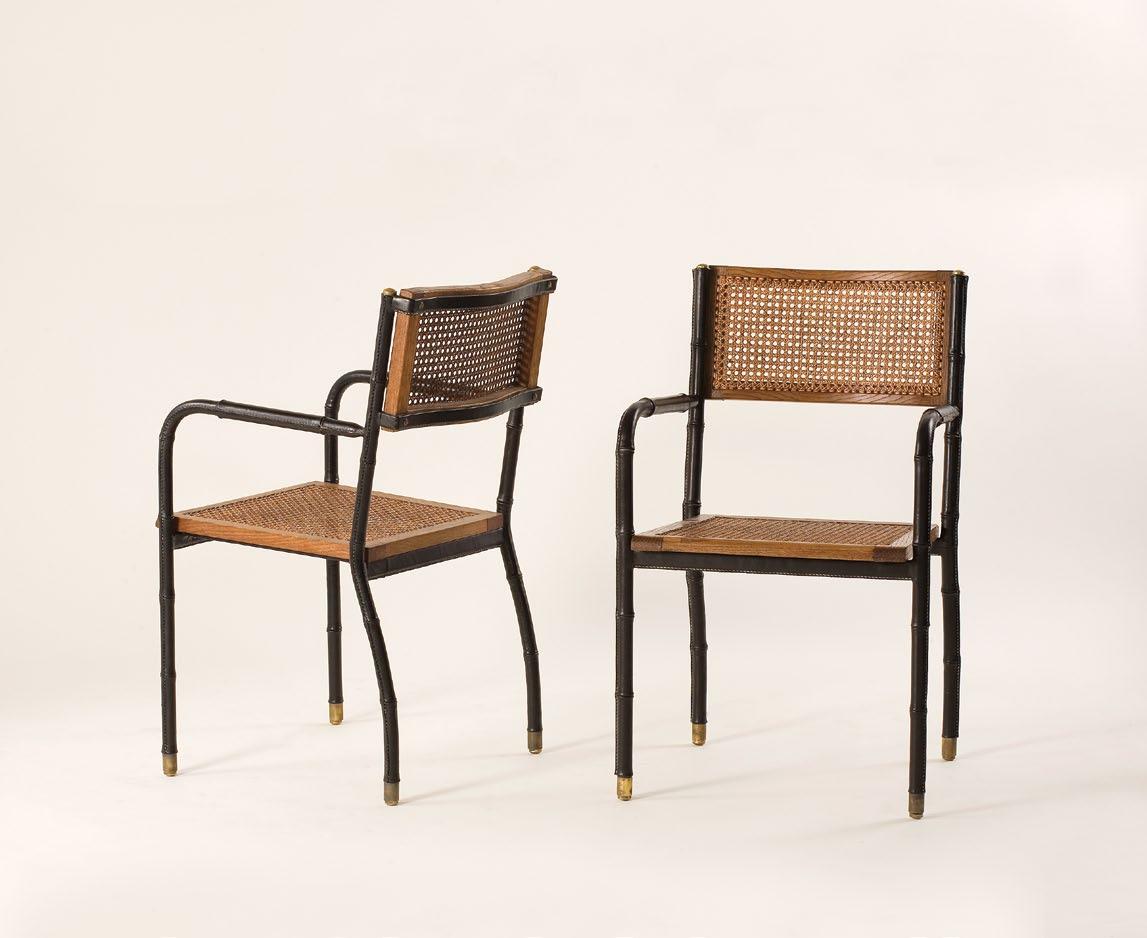

DESIGNER: Jacques Adnet (1901-1984)
ORIGIN: France, circa 1950
HEIGHT: 32¾”
WIDTH: 20”
DEPTH: 21¾”
SEAT HEIGHT: 17½” ARM HEIGHT: 25”
DESIGNER: Jacques Adnet (1901-1984)
ORIGIN: France, circa 1950
HEIGHT: 70”
BASE DIAMETER: 16½”
SHADE DIAMETER: 20¼”
TRIPOD BASE FLOOR LAMP Brass


with the lower portion of stem covered in its original saddle-stitched leather.
DESIGNER: Jacques Adnet (1901-1984)
ORIGIN: France, circa 1950
HEIGHT: 68½”
BASE DIAMETER: 16”
SHADE DIAMETER: 11¼”
stem and tripod base PAIR OF TRIPOD BASE FLOOR LAMPS Original saddle-stitched leather on faux bamboo brass stem ending on tripod base.TWO-DOOR ARMOIRE

Oak
DESIGNER: Jacques Adnet (1901-1984)
ORIGIN: France, circa 1950
HEIGHT: 69¼”
WIDTH: 49¼”
S EAT HEIGHT: 25”
DEPTH: 27¾”
with original burgundy saddlestitched leather wrapped metal legs and strap details.PAIR OF SIDE TABLES
Red saddle-stitched leather with brass drawer pulls, lower shelves, and sabots.

DESIGNER: Jacques Adnet (1901-1984)
ORIGIN: France, circa 1950
STOOL
Original brown saddle-stitched leather.
DESIGNER: Jacques Adnet (1901-1984)
ORIGIN: France, circa 1950

P RO v
ENANCE: Mrs. Barrière’s Master Bedroom decorated by Carlhian, Hotel Majestic, Cannes.
HEIGHT: 22½”
WIDTH: 24” DEPTH: 12¾”
HEIGHT: 17¼”
WIDTH: 17½”
DEPTH: 14”
RARE TWO-DOOR CABINET
Oak cabinet on black wrought iron frame with rope details.

DESIGNER: Jacques Adnet (1901-1984)
ORIGIN: France, circa 1950
HEIGHT: 42” WIDTH: 56½“ DEPTH: 21”

WALL-MOUNTED SHELv ES
DESIGNER: Jacques Adnet (1901-1984)


ORIGIN: France, circa 1950
dimensions vary
Metal hanging system with shelves covered in leather & trimmed in bamboo.PAIR OF TABLE LAMPS

Original saddle-stitched leather
DESIGNER: Jacques Adnet (1901-1984)
ORIGIN: France, circa 1960
HEIGHT: 23” BASE DIAMETER: 6½”
SHADE DIAMETER: 14”
RARE PAIR OF TALL TWO-ARM SCONCES
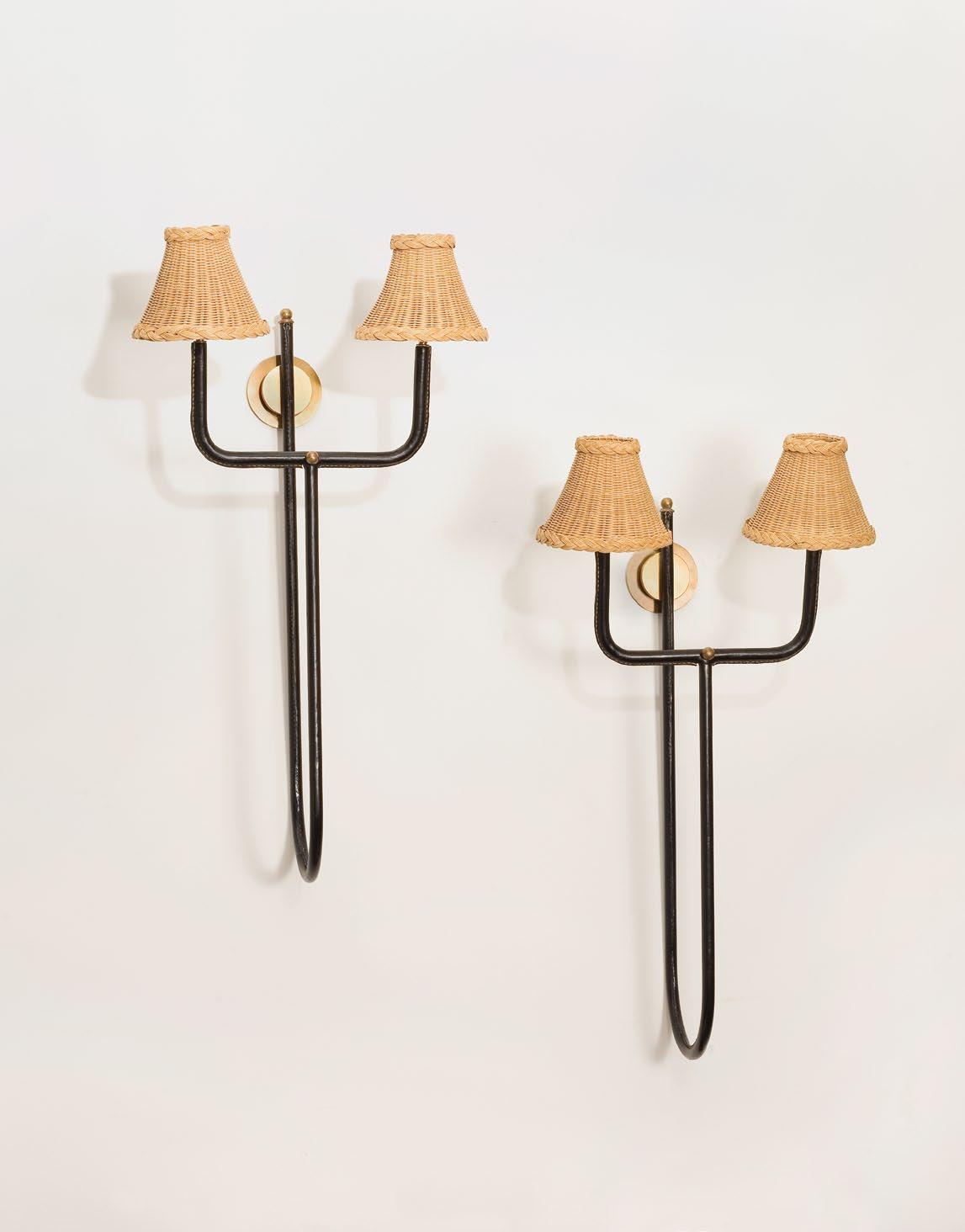
Original saddle-stitched leather and bronze with wicker shades.
DESIGNER: Jacques Adnet (1901-1984)
ORIGIN: France, circa 1950
HEIGHT: 40”
WIDTH: 20½“
DIAMETER: 17½”
on faux bamboo brass stem ending on tripod base.SINGLE
DESIGNER: Jules Leleu (1883-1961)
ORIGIN: France, circa 1957
HEIGHT: 33½” WIDTH: 23½” DEPTH: 22”
S EAT HEIGHT: 18½” ARM HEIGHT: 26”
SINGLE SIDE CHAIR Covered in original saddle-stitched green leather and leatherette with legs ending in gilt-bronze sabots


DESIGNER: Jules Leleu (1883-1961)
ORIGIN: France, circa 1957
HEIGHT: 33¼”
WIDTH: 20½” DEPTH: 22”
SEAT HEIGHT: 18½”
ARMCHAIR Covered in original saddle-stitched green leather and leatherette with legs ending in gilt-bronze sabots.FLOOR LAMP Original saddle-stitched leatherette and nickeled metal.

DESIGNER: Jacques Quinet (1918-1992)
ORIGIN: France, circa 1960
HEIGHT: 66” BASE DIAMETER: 15”
SHADE DIAMETER: 20”
RECTANGULAR TWO-TIER SIDE TABLE Laminated top and lower shelf with legs covered in original saddle-stitched leatherette ending in brass sabots.

DESIGNER: Jacques Quinet (1918-1992)
ORIGIN: France, circa 1960
HEIGHT: 16”
WIDTH: 24¼”
DIAMETER: 16¼”
THREE-SEATER SOFA
Original saddle-stitched leatherette with chrome sabots.
DESIGNER: Jacques Quinet (1918-1992)
ORIGIN: France, circa 1960
PRO v ENANCE: This sofa was commissioned for the offices of Ciments Français , a cement factory in the North of France.

HEIGHT: 28¼”
WIDTH: 73¼” DEPTH: 32½”
TWO OF A SET OF FOUR SLIPPER CHAIRS

Original saddle-stitched plum leatherette with chrome sabots.
DESIGNER: Jacques Quinet (1918-1992)
ORIGIN: France, circa 1960
PROv ENANCE: These chairs were commissioned for the offices of Ciments Français , a cement factory in the North of France.
HEIGHT: 28½”
WIDTH: 23” DEPTH: 27¾”
SEAT HEIGHT: 13½”
RECTANGULAR TWO-TIER SIDE TABLE Laminated top and lower shelf with legs covered in original saddle-stitched leatherette ending in brass sabots.


DESIGNER: Jacques Quinet (1918-1992)
ORIGIN: France, circa 1960
HEIGHT: 24¼”
WIDTH: 19¾” DEPTH: 14”
RECTANGULAR SIDE TABLE Laminated top with stretcher and legs covered in original saddle-stitched leatherette ending in brass sabots.
DESIGNER: Jacques Quinet (1918-1992)
ORIGIN: France, circa 1960
HEIGHT: 18”
WIDTH: 17¼”
DEPTH: 13¾”
TWO-DRAWER COMMODE Original saddle-stitched leatherette with laminate top and patinated metal legs.


DESIGNER: Jacques Quinet (1918-1992)
ORIGIN: France, circa 1960
PRO v ENANCE: Officer’s cabin of the ocean liner Zambée
HEIGHT: 33½” WIDTH: 39¾” DEPTH: 18¼”
RECTANGULAR TWO-TIER SIDE TABLE
Laminated top with lower shelf covered in original saddle-stitched leatherette, patinated metal legs ending in nickeled bronze caps.

DESIGNER: Jacques Quinet (1918-1992)
ORIGIN: France, circa 1960
PRO v ENANCE: Officer’s cabin of the ocean liner Zambée
HEIGHT: 19¾” WIDTH: 16” DEPTH: 14”
SINGLE ARMCHAIR
Original saddle-stitched leatherette with patinated metal legs.
DESIGNER: Jacques Quinet (1918-1992)

ORIGIN: France, circa 1960
PRO v ENANCE: Officer’s cabin of the ocean liner Zambée
HEIGHT: 36” WIDTH: 28” DEPTH: 31”
SEAT HEIGHT: 17½”
ARM HEIGHT: 11”
UNUSUAL O v AL TABLE

Original travertine top with bullnose edge on two sets of patinated wroughtiron legs wrapped with brass wire.

DESIGNER: Unknown
ORIGIN: France, circa 1960
HEIGHT: 29”
LENGTH: 81¼”
WIDTH: 37½”
T H e r oyere C o LL e CT ioni n 1957, Jean r oyère redecorated Loch-Bihan , his family’s 16th century Brittany farmhouse. a side from the dramatic fireplace in the shape of the traditional high Breton bonnet, the only pieces he added of his own design were in his personal bedroom suite: furniture and lighting fixtures made of tubular metal wrapped in bright blue plastic wires that playfully mimicked the look of rattan.
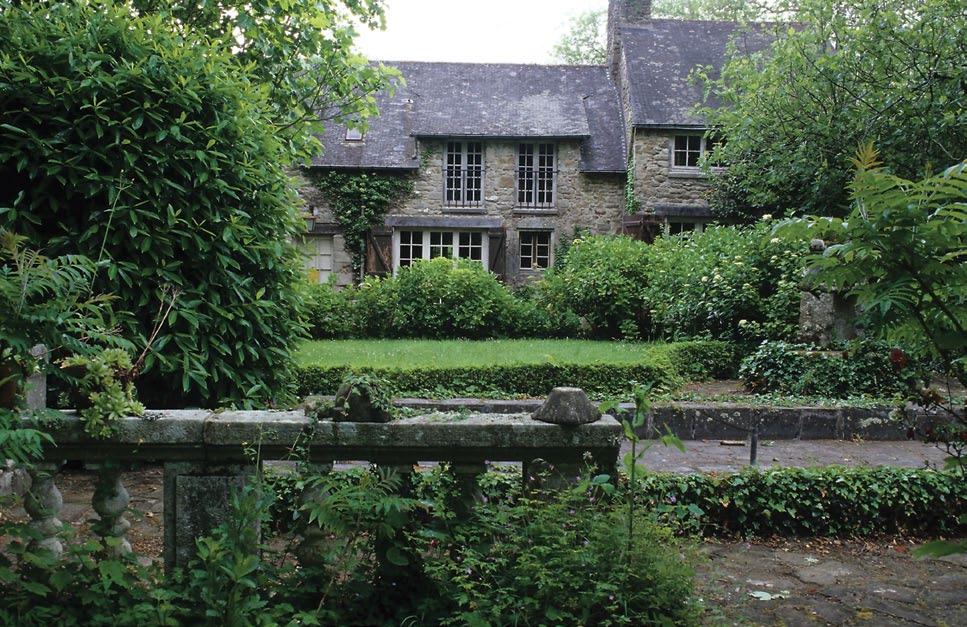
i n a typewritten letter to his sister (“ma chère petite Loulette”), dated January 15, 1981, r oyère provided a detailed account of the items she would soon inherit.
“ i have forgotten to speak to you about my own bedroom on the first floor of Loch-Bihan. it does not have anything antique except the enormous wooden beam that divides the room in two. The furniture was designed by me and it is the first time that we tried to put faux rattan on a metal tubular structure instead of natural malacca.”
 Opposite: Jean Royere at Loch-Bihan. Plaisir de France , April 1959. Above: An exterior view of Loch-Bihan. Photos courtesy of Jean-Francois Jaussaud
Opposite: Jean Royere at Loch-Bihan. Plaisir de France , April 1959. Above: An exterior view of Loch-Bihan. Photos courtesy of Jean-Francois Jaussaud
PAIR OF ARMCHAIRS
DESIGNER: Jean Royere (1902-1981)
ORIGIN: France, circa 1960
HEIGHT: 35¾” WIDTH: 25¼” DEPTH: 11½”
SEAT HEIGHT: 14¾” ARM HEIGHT: 22½”
PAIR OF SIDE CHAIRS


DESIGNER: Jean Royere (1902-1981)
ORIGIN: France, circa 1960
HEIGHT: 37¾”
WIDTH: 16¾” DEPTH: 18½“
SEAT HEIGHT: 17”
Tubular metal wrapped with original blue faux malacca. Tubular metal wrapped with original blue faux malacca.TRIANGULAR SIDE TABLE
Tubular
DESIGNER: Jean Royere (1902-1981)
ORIGIN: France, circa 1960
HEIGHT: 19½” WIDTH: 22” DEPTH: 20”
SEAT HEIGHT: 14¾” ARM HEIGHT: 22½”
SLIPPER CHAIR
DESIGNER: Jean Royere (1902-1981)


ORIGIN: France, circa 1960
HEIGHT: 35” WIDTH: 19½” DEPTH: 11½”
SEAT HEIGHT: 11¼”
Tubular metal wrapped with original blue faux malacca. metal wrapped with original blue faux malacca, glass top. shown above with slipper chairLARGE COFFEE TABLE
Persian copper tray top with raised scalloped edges on tubular metal legs and stretchers wrapped with original blue faux malacca.


shown with side chair
DESIGNER: Jean Royere (1902-1981)
ORIGIN: France, circa 1960
HEIGHT: 17¾”
DIAMETER: 44”
THREE-ARM FLOOR LAMP

DESIGNER: Jean Royere (1902-1981)
ORIGIN: France, circa 1960
HEIGHT: 46”
WIDTH: 20½”
DEPTH: 20½”
Tubular metal wrapped with original blue faux malacca and parchment paper shades.DESIGNER: Jean Royere (1902-1981)

ORIGIN: France, circa 1960
HEIGHT: 17¾” WIDTH: 13¼” DEPTH: 8½”
 PAIR OF TABLE LAMPS
Tubular metal wrapped with original blue faux malacca.
PAIR OF TABLE LAMPS
Tubular metal wrapped with original blue faux malacca.
The House of Leleu by Françoise Siriex, New York, Hudson Hills Press, 2008, p. 80.








© House of Leleu Hudson Hill Press
















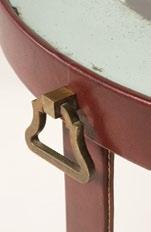


First published by Editions Monelle Hayot, Château de Saint-Remyen-l’Eau, France
 Mobilier et Décoration n° 34, 1954, p. 406.
Photo Les Arts Décoratifs , Paris, France
Art & Decoration n°83, 1960, p. 32
Le Décor D’Aujourd’hui n°75, 1952, p. 48 Art et Décoration , Paris n°18, 1950, p.40.
Les Décorateurs des années 50 by Patrick Favardin, Paris, Éditions Norma, 2002, p. 22, for a similar commode.
Le Décor D’Aujourd’hui n°75, 1952, p. 48, for a similar model.
Mobilier et Décoration n° 34, 1954, p. 406.
Photo Les Arts Décoratifs , Paris, France
Art & Decoration n°83, 1960, p. 32
Le Décor D’Aujourd’hui n°75, 1952, p. 48 Art et Décoration , Paris n°18, 1950, p.40.
Les Décorateurs des années 50 by Patrick Favardin, Paris, Éditions Norma, 2002, p. 22, for a similar commode.
Le Décor D’Aujourd’hui n°75, 1952, p. 48, for a similar model.














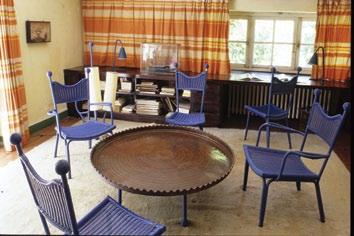














Gerardus Widdershoven and Benoist F. Drut would like to extend their sincere thanks to:
Agnès Callu, Carol Chabert, Guillemette Delaporte and Jean-Luc Olivié
Le Musées des Arts décoratifs, Paris, France; Galerie Arcanes, Paris; Galerie Jacques Lacoste, Paris; Galerie Yves Gastou, Paris; Marie & Cyril Grizot; Monelle Hayot, Editions Monelle Hayot; Maité Hudry, Editions Norma; Jean-Francois Jaussaud and Nam Le Duc; Pierre-Emmanuel Martin-vivier; Aurélien Moline, Les Editions de l’Amateur; Emmanuelle Quinet Tomat; Nathalie Romond, Clara & David Hornez; Laura Silverman; Françoise Siriex; Laurent Sully-Jaulmes; Marie de villefranche; Diego
Heredia; Christopher Knight; Margaret Kim; Heather Kristensen
Photography by Robert Levin Design by Mother
